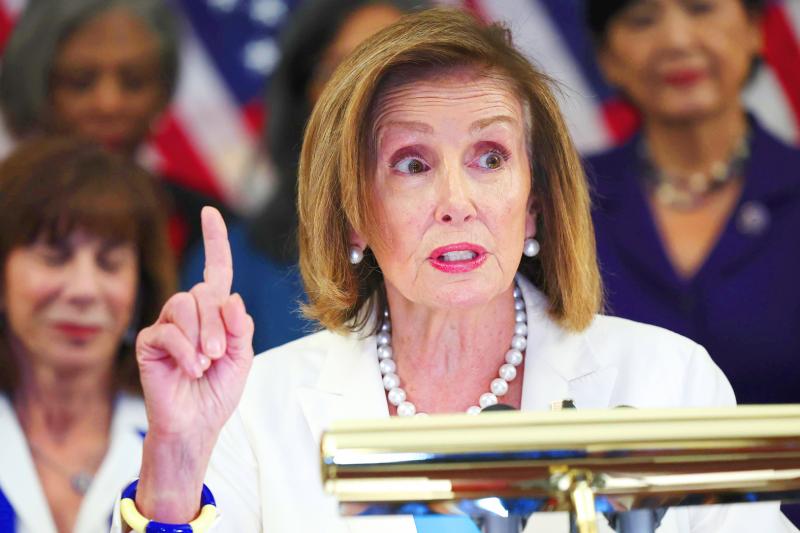Former US secretary of state Mike Pompeo yesterday said that he was willing to travel to Taiwan with US House of Representatives Speaker Nancy Pelosi.
“Nancy, I’ll go with you. I’m banned in China, but not freedom-loving Taiwan,” Pompeo wrote on Twitter. “See you there!”
Pompeo — who visited Taiwan for the first time in March and has urged the US to officially recognize it as a free, independent nation, and establish official diplomatic ties — made the comment amid frothy rhetoric from China and contradictory signals coming out of Washington over Pelosi’s possible visit.

Photo: AFP
The Financial Times on Monday last week first reported that Pelosi was planning to visit Taiwan next month.
Pelosi has not confirmed when, or even if, she would visit.
Should the trip be confirmed, Pelosi would be the first sitting US House speaker to visit Taiwan since 1997, when her predecessor Newt Gingrich of the Republican Party traveled to Taipei and met then-president Lee Teng-hui (李登輝) during another period of tense cross-strait relations.

File photo: AP
The Chinese Ministry of Foreign Affairs on Tuesday last week said that a visit to Taiwan by Pelosi would seriously undermine China’s sovereignty and territorial integrity, and the US would bear the consequences of its response.
US President Joe Biden on Wednesday last week said that he plans to speak with Chinese President Xi Jinping (習近平) by the end of the month. Biden appeared to cast doubt on Pelosi’s reported trip to Taiwan.
“I think that the military thinks it’s not a good idea right now, but I don’t know what the status of it is,” Biden told reporters.
The Financial Times on Saturday cited sources as saying that China has issued stark private warnings to the Biden administration, adding that the private rhetoric suggested a possible military response.
China yesterday confirmed that it had delivered sterner warnings to US officials about Pelosi’s possible visit to Taiwan.
“The Chinese side has made it clear to the US on many occasions that it is firmly opposed to Speaker Pelosi’s visit to Taiwan. We are fully prepared,” Chinese Ministry of Foreign Affairs spokesman Zhao Lijian (趙立堅) told a media briefing.
“If the US goes its own way, China will certainly take firm and forceful measures to safeguard its national sovereignty and territorial integrity, and the United States should be held responsible for any serious consequences,” he said.
A number of Republican US lawmakers have urged Pelosi to proceed with the trip.
Among them were US representatives Tom Tiffany and Scott Perry.
“We strongly encourage you to reject the objections of China’s rulers and President Biden and proceed with your planned trip,” they said in a joint letter on Friday. “As the Speaker of the United States House of Representatives, you should never have to ask a foreign dictatorship or the State Department for permission to talk to America’s friends and allies.”
They also called on Pelosi to convene a floor vote to pass a resolution to end “the outdated and nonsensical” “one China” policy to normalize US-Taiwan relations.
“The world has undergone dramatic changes since the days of [former US presidents] Richard Nixon and Jimmy Carter. Taiwan has become a vibrant, multiparty democracy, while China has become more oppressive, more belligerent, and more dangerous,” the letter said.
“Yet America’s policy framework remains on autopilot, frozen in a 1970’s time warp. It is time for [the US] Congress to revisit this policy and have an open and honest debate about how best to modernize it,” it said.

CHAOS: Iranians took to the streets playing celebratory music after reports of Khamenei’s death on Saturday, while mourners also gathered in Tehran yesterday Iranian Supreme Leader Ayatollah Ali Khamenei was killed in a major attack on Iran launched by Israel and the US, throwing the future of the Islamic republic into doubt and raising the risk of regional instability. Iranian state television and the state-run IRNA news agency announced the 86-year-old’s death early yesterday. US President Donald Trump said it gave Iranians their “greatest chance” to “take back” their country. The announcements came after a joint US and Israeli aerial bombardment that targeted Iranian military and governmental sites. Trump said the “heavy and pinpoint bombing” would continue through the week or as long

TRUST: The KMT said it respected the US’ timing and considerations, and hoped it would continue to honor its commitments to helping Taiwan bolster its defenses and deterrence US President Donald Trump is delaying a multibillion-dollar arms sale to Taiwan to ensure his visit to Beijing is successful, a New York Times report said. The weapons sales package has stalled in the US Department of State, the report said, citing US officials it did not identify. The White House has told agencies not to push forward ahead of Trump’s meeting with Chinese President Xi Jinping (習近平), it said. The two last month held a phone call to discuss trade and geopolitical flashpoints ahead of the summit. Xi raised the Taiwan issue and urged the US to handle arms sales to

BIG SPENDERS: Foreign investors bought the most Taiwan equities since 2005, signaling confidence that an AI boom would continue to benefit chipmakers Taiwan Semiconductor Manufacturing Co’s (TSMC, 台積電) market capitalization swelled to US$2 trillion for the first time following a 4.25 percent rally in its American depositary receipts (ADR) overnight, putting the world’s biggest contract chipmaker sixth on the list of the world’s biggest companies by market capitalization, just behind Amazon.com Inc. The site CompaniesMarketcap.com ranked TSMC ahead of Saudi Aramco and Meta Platforms Inc. The Taiwanese company’s ADRs on Tuesday surged to US$385.75 on the New York Stock Exchange, as strong demand for artificial intelligence (AI) applications led to chip supply constraints and boost revenue growth to record-breaking levels. Each TSMC ADR represents

State-run CPC Corp, Taiwan (CPC, 台灣中油) yesterday said that it had confirmed on Saturday night with its liquefied natural gas (LNG) and crude oil suppliers that shipments are proceeding as scheduled and that domestic supplies remain unaffected. The CPC yesterday announced the gasoline and diesel prices will rise by NT$0.2 and NT$0.4 per liter, respectively, starting Monday, citing Middle East tensions and blizzards in the eastern United States. CPC also iterated it has been reducing the proportion of crude oil imports from the Middle East and diversifying its supply sources in the past few years in response to geopolitical risks, expanding